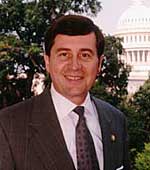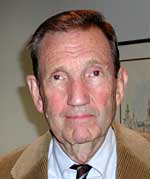By Rob Schmitz
Minnesota Public Radio
December 14, 2001
|
| RealAudio |
As the military campaign against Al-Qaeda tightens, so does a campaign launched by Minnesota 1st District Rep. Gil Gutknecht. Gutknecht wants Sheikh Omar Abdel Rahman transferred out of Rochester's Federal Medical Center to a secret location. Rahman, 63, is serving a life sentence for conspiracy in the World Trade Center bombing of 1993. Gutknecht, a Republican, says the sheikh's presence poses a threat to Rochester.
| |
|
|
|
||
Gutknecht made his original request to move the sheikh in late October. The Federal Bureau of Prisons promptly denied the request.
Now, Gutknecht says he will discuss the issue with Attorney General John Ashcroft and high-ranking members of the Bush administration. Gutknecht says Osama bin Laden's vows to free the sheikh have put residents of Rochester in immediate danger.
"They've talked about taking public figures hostage. They'd most likely take people hostage in Rochester," says Gutknecht. "Let's say they went to the community college, let's say they went to an elementary school. Just think about the possibilities. What would we do? Are we prepared to deal with that? The answer is no!"
Abdel Rahman resides at Rochester's Federal Medical Center because he is blind and diabetic. Gutknecht says the sheikh shouldn't be at the facility because he's turning down treatment.
"I am told, from sources inside the prison, that he basically refuses most forms of medical care anyway. He can be kept at any facility the U.S. government has. He could be kept at a military base in a prison-type facility," Gutknecht says.
Two weeks ago, one of Abdel Rahman's sons was captured in Afghanistan. Ahmed Abdel Rahman is now being interrogated by U.S. personnel on the assumption that he is a high-ranking member of the al-Qaeda organization.
He may be one of the first prisoners of war referred for trial by a U.S. military tribunal. If convicted, the sheikh's son could do time in a U.S. military prison.
Gutknecht is proposing all prisoners with terrorist connections should be held in military prisons, regardless of their health - including Sheikh Abdel Rahman.
"You're inviting a potential problem, and you're putting an awful lot of people at risk - for what reason?" says Gutknecht. "The reason, I guess, is that he's afforded all the American constitutional rights as if he were an American citizen. He's not an American citizen, and that's one of the other lunacies we've got to get the Justice Department to deal with."
| |
|
|
|
||
Gutknecht says those suspected of or convicted of terrorism are typically not U.S. citizens. Therefore, they do not have the same rights as American prisoners.
"I think he's quite wrong," says Mohamedu Jones, an attorney for the American Civil Liberties Union's National Prisoner Project in Washington, D.C. He says the Eighth Amendment gives all prisoners - even illegal aliens - the same rights.
"I do not know of any case under the Eighth Amendment where a court anywhere has said that a foreigner can be treated any differently," says Jones. "For example, voting is clearly limited to citizens. To be a candidate for the president, you must be a native citizen, born in the United States. So there are provisions in the Constitution that clearly restrict and designate rights to citizenship. There are others that don't."
Although the Constitution does guarantee certain rights for prisoners, nowhere does it say the public should have access to information about where a prisoner is held.
That information is currently accessible over the Internet, at the Federal Bureau of Prisons Web page.
Gutknecht says with just a few clicks, a terrorist could conceviably look up the sheikh's name, find out where he's incarcerated, and then go to Mapquest, where he could get directions to the facility.
Jones says Gutknecht's campaign to limit access to information about prisoners like Abdel Rahman could succeed, with enough support from other members of Congress.
Since Sept. 11, the Bush administration has taken several special administrative measures in response to terrorism. A congressional petition is all they might need to move prisoners like Abdel Rahman to secret locations.
"I think when you consider that even the Federal Bureau of Prisons and/or attorney general could be petitioned, I don't find it totally inconceivable that a member of Congress could petition them - for whatever reason - to propose that a prisoner could be held somewhere else, other than their district," says Jones.
| |
|
|
|
||
Since Sept. 11, the Justice Department cut off all communication between Sheikh Omar Abdel Rahman and his family. He is now only allowed to talk to his attorney, former Attorney General Ramsey Clark.
Clark served as attorney general in the Johnson administration and assistant attorney general in the Kennedy administration.
He has counseled a number of controversial individuals, including Radovan Karadzic, the indicted Bosnian Serbian war criminal, and former Yugoslav President Slobodan Milosovic.
Clark, speaking in the Twin Cities recently, said Gutknecht's request to move his client to a different prison is absurd.
"It sounds to me like he's a congressman who doesn't have any real issues, or stand for anything. If that's his only concern, that must be a blissful district he represents," Clark said.
Clark says he and his team of lawyers speak to Abdel Rahman frequently over the telephone. Beginning last month, new federal regulations have allowed the government to monitor these conversations. Clark says these measures are an infringement of the priniciples of the Constitution. He says they remind him of how he came to defend Abdel Rahman in the first place.
According to Clark, Abdel Rahman was without a defense attorney for 15 months into the World Trade Center bombing trial, before he volunteered to represent the sheikh.
"We don't use the law as a weapon to destroy people that we decide are evil. We use it as a means of applying principles equally to everyone," Clark says. "Without representation, the idea that Sheikh Omar Abdel Rahman would go to trial without a lawyer in the United States of America would be terrible. What kind of country are we?"
Clark says for a country that believes in the rule of law, we should not convict by public opinion.
According to Rep. Gutknecht, in a time of war, we need to be a more secure country. And for him, this means a re-evaluation of what should, and shouldn't be, public information.
More from MPRMore Information



